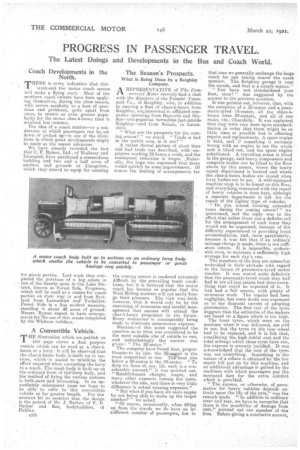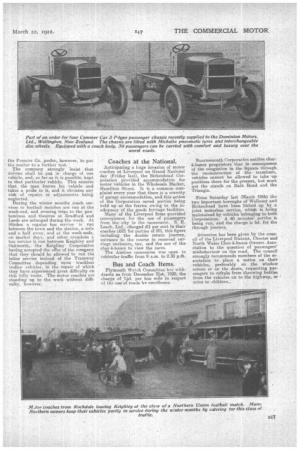PROGRESS IN PASSENGER TRAVEL.
Page 20

Page 21

If you've noticed an error in this article please click here to report it so we can fix it.
The Latest Doings and Developments in the Bus and Coach World,
Coach Develoments in the North.
THERE is every indication that this week-end the motor coach season will make a flying start. Most of the northern coach owners have been applying themselves, during the close season, with severe assiduity to a host of questions and problems, quite apart from rates, to ensure an even greater popularity for the motor char-a-bancs than it attained last summer.
The idea of a coach station—or a rendezvous at which passengers can be. set down or picked up—is one of the directions in which great developments might be made as the season advances.
We have alceady recorded the fact that 0. F. Rymer, Ltd., of Wallasey and Liverpool, have purchased a commodious building and two and • a half acres of .gardens and grounds at Llangollen, which they intend to equip for catering
for picnic parties. Last week they completed the purchase of a big estate in one of the beauty spots in the Lake District, known as Forest Side, Frogmere, which will be used as a centre for coach parties on their way to and from Scotland from Lancashire and Yorkshire. Forest Side is a fine modern mansion, standing in about 40 acres of ground. Messrs. Rymer expect to have arrangements for the use of this estate completed by the Whitsun holidays.
. A Convertible Vehicle.
THE illustration which we publish on this page shows a dual purpose vehicle which can be used as a char-a. banes or a, lorry. It will be observed that the char4-bancs body is ;built up in sections, which kis: stated to minimize the effort required when converting the lorry to a coach. The Coach body is built up on the ordinary form of thielony body, and the method of, fixing the various sections is both-neat and interesting. In an immediately subsequent issue we hope to be able to refer to this convertible vehicle at far greater length. For the moment let us mention that the design Is the patent of Mr. J. Barker, of F. D Barker and Son, bodybuilders, of IIalifax,
old
The Season's Prospects.
What is Being Done by a Keighley Company.
AREPRESENTATIVE of The Commercial Motor recently ihad a chat with the directors of the Premier Transport Co., of Keighley, who, in addition to running a fleet of chars4-bancs from Keighley, arcinterested in affiliated companies operating from Haworth and Silsden—two populous townships just outside Keighley—and from Nelson, in Lancashire.
" What are the prospects for the coming season? " we asked. " Trade is bad in the textile area, is it not? " A rather dismal picture of short time and bad trade was described, with ■ employees working 24 hours a week, and the congequent reduction in wages. .Naturally, the hope was expressed-that there would quickly he some improvement. Of course the making of arrangements for
the coming season is rendered extremely difficult by the prevailing trade conditions,but it is believed that the motor coach. has become so popular that the West Riding workers will not easily forego their pleasure. The view was -held, however, that it would only be by the exercising of economies and careful management that success will attend the char-h-bancs proprietor in the future. Every endeavour is consequently being made to eliminate unnecessary expense.
Mention of this point suggested the question as to what was considered to be the most suitable size of vehicle to run, and unhesitatingly the answer was given : " The 28-seater."
The company have found that, propertionatei: to its size, the_ 28–coaster. is the most economical to run. The'-next size below a 28-seater is the 22-seater, "To drop six fares at, say, 15s. each is a considerable amount," it was. pointed out. " Establishment charges, wages, and many other expenses remain the same, whatever the size, and there is very little difference in actual running expenses."
" But what if you have six seats empty by not being able to make up the larger number? " we asked.
"Of course, occasionally, when filling up from the stands we do have an in sufficient number of passengers, but in that case we generally exchange the large coach for one taking nearer the exact 'limber. The Keighley garage is near the stands, and that is a simple matter." " You have not standardized your fleet, then? " was suggested by the answer to the previous vestion.
It was pointed out, however, that, with the exception of a 22-seater and a pneu
matic,tyred 14-seater, all the chars-itbasics were 28-seaters, and all of one make, viz., aurchills. It was explained that they were very keen upon standardization in order that there might be as little time as possible lost in effecting repairs and replacements. A spare engine is held, and if something is seriously wrong with an engine in use the whole unit is lifted out, and the spare engine substituted. A travelling crane is fitted in the garage and heavy components and complete bodies can be lifted to the floor above by this means, where the heavy repair department is located and where the char-a-bancs bodies are stored when lorry bodies are in use. A well-equipped machine shop is to be-found on this floor, and everything connected with the repair of heavy vehicles is done here, although a separate department is left for the repair of the lighter type of vehicles.
De you intend running extended tours during the coming season? " we questioned, and the reply was to the effect that unless there was a definite call for the arrangement of such tours they would not be organized, because of the difficulty experienced in providing hotel accommodation, and, more particulrrly, because it was felt that if an ordinary mileage charge is made, there is not suffittient return. It is impossible, undesirable even, to maintain a sufficiently high average for each day's run.
The members of the firm are somewhat undecided in their 'attitude with regard to the future of pneumatic-tyred motor coaches. It was stated quite definitely that the pneumatic-tyred coach they had had in use all last season had done everything that coiild be "expected of it. It had had a full season, with plenty of strenuous work. The repairs had been negligible, but some doubt was expressed as to the financial success of adopting pneumatics. The first test of the tyres suggests that the estimates of the makers are based on a figure which is too high.
The front tyres, which were on the machine when it was delivered, are still in use, but the tyres on the rear•wheel had to be replaced,. and it is felt that, considering the high initial cost and the total mileage which these tyres have run,
the expense is scarcely justified. was acknowledged that the costof the tyres was not everything. Something in• the nature of a rebate is obtained by the low nepair bill put up by this machine' and an additional advantage is gained by the readiness with which passengers pay the increased fare for the extra comfort which is provided.
" The success, or otherwise, of pneumatics for heavy vehicles depends entirely upon the life of the tyre," was the remark made. "In addition to ordinary wear and tear, we.have to recognize that there is the possibility of damage from cuts," pointed out one member of -the firm. Before giving a conclusive answer, the Premier Co. prefer, however, to put the matter to a further test.
The company strongly insist that drivers shall be pat in charge of one vehicle, and, so fares it is possible, kept to that particular vehicle. This ensures that the man knows his vehicle and takes a pride in it, and it obviates any risk • of repairs or adjustments being neglected.
During the winter months coach services to football matches are run at the week-end, and evening trips to the pantomimes and theatres at Bradford and Leeds are arranged during the week. At Silsden a regular bus service is run between the town and the station, a mile and a half away, and at the week-ends, on market days, and other occasions a bus service is run between Keighley and Oakworth,the Keighley Corporation having accepted the offer of the company that they should be allowed•to run the latter service instead of the Tramway Committee depending upon trackless trolley vehicles, in the repair of which they have experienced great difficulty on this hilly route. The motor coaches are standing up to the work without difficulty however.
Coaches at the National.
Anticipating a huge invasion of motor coaches at Liverpool on Grand National day (Friday last), the Birkenhead Corporation provided accommodation for motor vehicles in the Wholesale Market, Hamilton Street. It is a common complaint every year that there is a scarcity of garage accommodation, and this action of the Corporation saved parties being held up at the ferries owing to the inadequacy of the goods ferriage facilities.
Many of the Liverpool firms provided conveyances for the use of passengers from the city to the racecourse. S. E. Leach, Ltd., charged £1 per seat in their coaches (£21 for parties of 29), this figure including the double return journey, entrance to the course in reserved carriage enclosure, tax, and the use of the char-a-banes to view the races.
The Aintree racecourse was open to vehicular traffic from 9 a.m. to 2.30 p.m.
Bus and Coach Items.
Plymouth Watch Committee has withdrawn as from December 31st, 1920, the eha,rge of 10 per bus mile in respect of the use of roads by omnibuses.
Bournemouth Corporation notifies chara-bancs proprietors that in consequence of the congestion in the Square through the reconstruction of the tramlines, vehicles cannot be allowed to take up positions there for the present, but must use the stands on Bath Road and the Triangle.
From Saturday last (March 19th) the two important boroughs of Wallasey and Birkenhead have been linked up by a joint motorbus service, which is being maintained by vehicles belonging to both Corporations. A 40 minutes' service is being ran, and the charge is 5d. for the through journey.
Attention has been given by the council of the Liverpool District, ohester and North Wales Char-a-bancs Owners Association to the question of passengers' misbehaviour on the road. The council strongly recommends members of the association to place a notice on their vehicles, preferably on the window screen or on the doors, requesting passengers to refrain from throwing bottles from the vehicles on to the highway, or Coins to children_
































